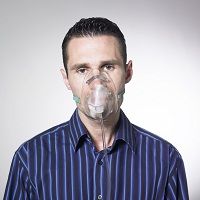Article
Analyzing Demographics of COPD Oxygen Therapy Patients
Author(s):
Oxygen therapy patients with diagnosed COPD often are of lower socioeconomic status and female, according to a report published in PLOS One.

A majority of patients with chronic obstructive pulmonary disease (COPD) who receive oxygen therapy are likely to be low income, non Hispanic, white, female, aged about 75-years-old, and living with 2 or more comorbidities, according to findings published in PLOS One.
Researchers from the University of Texas Medical Branch at Galveston examined Medicare beneficiaries with COPD who received oxygen from 2001 to 2010 in order to gather demographic data. The patients were grouped by factors such as having two or fewer outpatient visits less than 30 days apart within one year of an encounter diagnosis of COPD or an acute care hospitalization with COPD as the primary or secondary discharge diagnosis. The researchers used ≥1 and ≥11 claims for oxygen as measures for oxygen therapy and sustained oxygen therapy, respectively, throughout a calendar year. The researchers additionally wrote that COPD patients’ experience today is different than 2 landmark studies published on the subject 4 decades ago had previously described — hence, wanting to conduct the analysis.
The researchers found that oxygen therapy use increased from 33.1% of COPD patients in 2001 to 40.5% in 2010. For sustained oxygen therapy patients, use increased from 19.5% in 2001 to a peak of 26.9% in 2008. Sustained oxygen therapy experienced a decline to 18.5% by the year 2010.
“Overall, from 2001 to 2010, we report an increase in oxygen therapy,” Shawn Nishi, assistant professor in the internal medicine Division of Pulmonary, Critical Care and Sleep medicine, explained in a press release. “Oxygen use may be increasing because physicians and patients are becoming more aware of the benefits in COPD and there is a decreased perception of oxygen therapy as a stigma.”
In 2008, the statement continued, about 1.4 million Medicare patients were on oxygen therapy, which cost about $2.9 billion. That was nearly half of Medicare’s medical equipment cost for that year. Of the total patients, the majority (82%) had diagnosed COPD.
Of the more than 300,000 patients analyzed in the study, the majority were female. Factors associated with oxygen use or oxygen therapy included non-Hispanic race, low socioeconomic status, and 2 or more comorbidities, the researchers wrote. The average age of patients was 75-years-old.
“Any oxygen use among fee for service Medicare beneficiaries with COPD is high,” the authors concluded. “Current users of oxygen are older females with multiple comorbidities. Decline in sustained oxygen therapy use after 2008 may be related to reimbursement policy change.”




